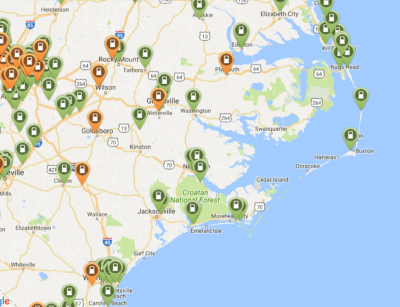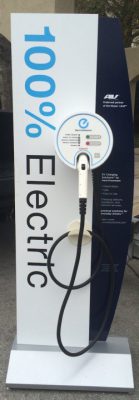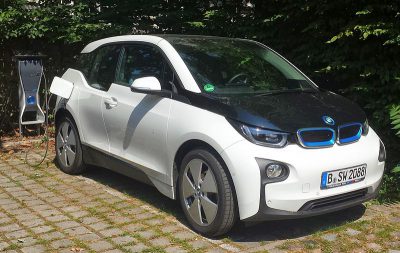EASTERN NORTH CAROLINA – People who drive electric cars will soon have more places to stop for a recharge around here.
Duke Energy recently awarded grants to Jacksonville, Oriental, Swansboro and CarolinaEast Health System in New Bern to cover the costs of installing electric vehicle charging stations. It’s part of a program to encourage adoption of electric vehicles by improving infrastructure needed to support their use. Jones County, Kinston, Wayne County and Goldsboro also received grants.
Supporter Spotlight

The deadline to apply for the program was in September. Duke Energy has yet to formally announce all the award winners, but some individual towns and cities have been notified.
Randy Wheeless, a spokesman for Duke Energy, said the company was pleased with the response to the grant program.
“We will end up with around 50 award winners. Right now, we’re just alerting cities and towns that they won and how much,” Wheeless said Thursday.
That’ll be enough for about 200 new public charging stations statewide. With a growing number of electric vehicles on the market for consumers to choose from, boosting the number of charging stations available to the public is key, Wheeless said.
“If we’re advocating more EV adoption, I think one of the barriers is how many charging stations are in the state,” he said.
Supporter Spotlight
The grant program stems from a $5.4 million legal settlement in 2015 with the Environmental Protection Agency and Justice Department of a lawsuit filed in 2000. The EPA and environmental groups alleged Duke Energy had violated federal Clean Air Act provisions by making modifications to five North Carolina power plants without also making required upgrades to air pollution controls. The Supreme Court found in favor of the EPA and Duke Energy agreed to settle rather than fight the lawsuit. The utility maintained it had complied with federal law, but agreed to pay a $975,000 fine and donate $4.4 million to environmental projects, including the installation of electric vehicle charging stations.
Duke Energy said in July its $1.5 million program will increase the number of public electric vehicle charging stations in North Carolina by 30 percent. The company’s EV Charging Infrastructure Support Project is to provide $1 million to help municipalities install public charging stations. Duke Energy will pay the total costs up to $5,000 per charge port, $20,000 per site or $50,000 per city under the program.

“Over the past decade, Duke Energy has supported the development of several hundred electric vehicle charging stations in North Carolina,” David Fountain, Duke Energy’s North Carolina president, said at the time. “Adoption of EVs depends on a robust infrastructure for consumers.”
In addition, Duke Energy is providing $500,000 to cities and towns for the construction of electric bus charging stations, funding the total costs up to $250,000 per entity.
The grant program provides leeway for the awarded cities and towns to choose locations to install the charging stations as they see fit, Wheeless said.
There are about 4,750 electric vehicles registered in North Carolina but only about 700 public charging ports around the state.
The Electric Power Research Institute estimates that there will be more than 700,000 electric vehicles in North Carolina by 2030 with 37,000 on the road in eastern North Carolina.
The New Bern-based East Carolina Council, the regional council of governments and planning organization serving Carteret, Craven, Duplin, Greene, Jones, Lenoir, Onslow, Pamlico and Wayne counties, has also been involved in promoting plug-in electric vehicle use and increasing the number of charging stations.
Judy Hills is the council’s executive director. Hills said the council began at the outset of the Duke Energy program to make sure communities knew about it.
“We really made a concerted effort to get the word out,” Hills said.
The council’s efforts to promote electric cars have also included forming a committee back in February to develop a plug-in electric vehicle readiness plan for the region surrounding the U.S. 70 corridor, which passes through many of the counties the council serves. This committee is now wrapping up its work, with a draft report set to be released soon.
The money for the planning effort came from an Economic Development Administration grant.
The promise of economic growth is often a good motivation for elected officials to get behind a project. Research has shown that installing a charging station at a business can increase customer traffic and shopping time. Businesses can also promote the stations to differentiate themselves from competitors. Municipalities with charging stations may also attract new businesses that value sustainable technology and innovation, according to the council.
Here on the coast, offering charging capabilities can also help lure environmentally conscious vacationers and visitors. But the response to these efforts has at times been only “lukewarm,” Hills said.

The council presented an electric vehicle drive event in Kinston on Sept. 17 to help promote the array of new electric cars on the market, but the event wasn’t well attended. Hills said there’s still an attitude in the region that electric vehicles are “for somebody else, not for me.” That will change with time, she said.
Part of the resistance is because this part of the state doesn’t have the air pollution other, more urban areas have. A key point for driving electric cars is that they don’t pollute, Hills said. Another aspect is the demographics of the eastern part of the state, where there may be a little more reluctance to embrace new technology.
“I think as technology adopters go, we sometimes seem to be a little behind the curve. Areas where people more readily adopt new technologies are way ahead of us,” Hills said.
But new products, including cars with longer-lasting batteries, and the addition of charging stations will encourage adoption and change minds.
“As those changes come about, more people will consider it when they buy a new car, or even a used car,” Hills said. “Also, changes in the environment and other things happening in the world may make that decision more attractive going forward. It may take us a little longer but I think we’ll get there.”
Hills cited a recent report that showed purchases of electric vehicles increase in areas after charging stations are installed there. That’s where the Duke Energy program can provide a big boost, she said.
“It’s hard to ask a government to make an investment in something that has a limited use. You have to think, what makes a government want to invest in this?” Hills said. “And so, this money that Duke has available for that will certainly go a long to helping move that along.”
The council is set to be recognized Tuesday for its efforts at the sixth annual Plug-in NC Summit in Raleigh.
Plug-in NC is a statewide program that promotes electric vehicles through education, outreach and consulting that has been working since 2011 to establish North Carolina as a leader in electrified transportation. The program provides resources for the public, including informational webinars and an interactive map to help drivers of electric vehicles locate charging stations available for public use.







